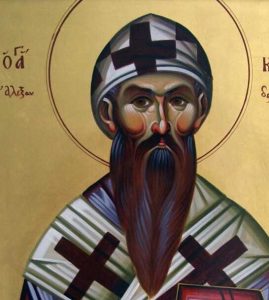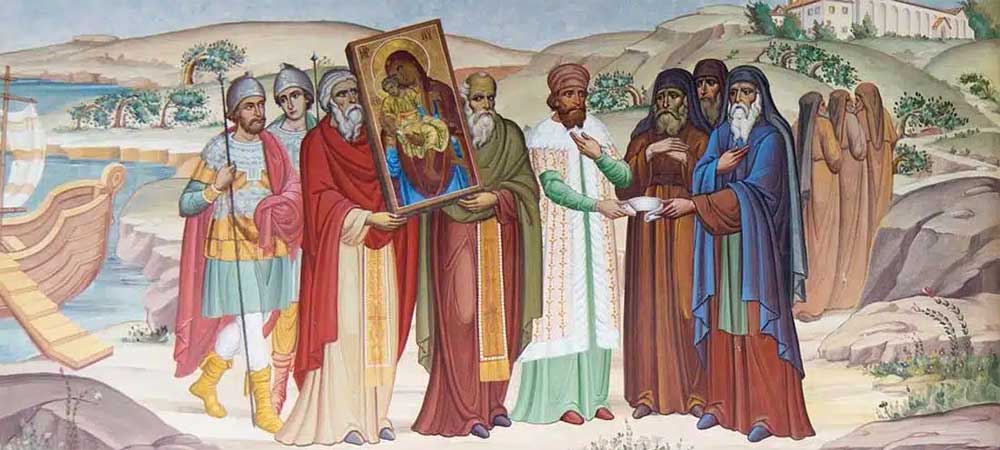Life of Saint Cyril
 Saint Cyril (375-444) was born in Alexandria around 378 to wealthy parents and was the nephew of the patriarch Theophilos. His parents made sure to give him a serious education. He studied grammar, rhetoric and philosophy at the renowned national schools of Alexandria and finally studied theology and biblical studies at the renowned Catechetical School. Around 400 he was ordained by his uncle Theophilus reader and then deacon and elder, who early showed his gifts and his deep commitment to the orthodox tradition.
Saint Cyril (375-444) was born in Alexandria around 378 to wealthy parents and was the nephew of the patriarch Theophilos. His parents made sure to give him a serious education. He studied grammar, rhetoric and philosophy at the renowned national schools of Alexandria and finally studied theology and biblical studies at the renowned Catechetical School. Around 400 he was ordained by his uncle Theophilus reader and then deacon and elder, who early showed his gifts and his deep commitment to the orthodox tradition.
In 403 he accompanied Theophilus to participate in the so-called Synod of Dryn, which deposed Saint John Chrysostom. It was the first unfortunate turn of his life. After his return to Alexandria he felt the need to further develop his spiritual growth and training. That is why he took refuge in the famous monasteries of Egypt, where there were holy ascetics, to get from them the spiritual supplies, which would be necessary for his subsequent ecclesiastical ministry. His uncle Theophilos sent him to the Monasteries of Nitria, to immerse himself in piety. He stayed five years in the Monastery of Agios Makarios, studying the Holy Bible under the guidance of Saint Serapion.
On October 15, 412, he came to Alexandria to attend the funeral of Theophilos and claim the episcopal throne. Although the aristocracy of Alexandria promoted Timothy for the episcopal throne, as did the political administration of the city, nevertheless Cyril was elected, who was enthroned on October 17, 412 and shepherded the Church of Alexandria for 32 years.
His episcopal ministry was not peaceful, because the great city of Alexandria was shaken by frequent revolutions and the local Church was torn apart by heresies and schisms. In the megalopolis and multi-ethnic Alexandria, remnants of ancient heretical and schismatic groups had found refuge, such as the Arians, the Marcionites, the followers of Paul Samosate, the Novatians, etc. which created serious problems for the Orthodox. Saint Cyril developed an admirable anti-heretical pastoral, so that he essentially neutralized the heretical groups, as a result of which he was targeted by the heretical leaders.
The remaining fanatical heathens of the dying nation were also causing problems. The priests of the idols, the soothsayers and all the parasites of the ancient religion, seeing their interests seriously affected by the desolation of the temples and oracles, cultivated in the ignorant and fanatical masses of the nations hatred and revenge against the Church and the Christians and in particular against Bishop Cyril.
Finally, the populous Jewish community of Alexandria, continuing the ancient enmity towards the Christians, often hid behind intrigues, pushing the fanatical pagans against the Christians, as well as the political administration of the city, which aligned itself with the enemies of the Church.
Saint Cyril tried to be a peacemaker between the opposing factions, but he did not always succeed. One of the most unfortunate moments of his pastorate was the murder of the Alexandrian philosopher Hypatia in 416, to whom some mischievous and ahistorical responsibilities are attributed. The occasion was the activation of some law for the confiscation of the Jewish synagogues, because the Jewish mob had committed violence against the Christians. Some Jews allied themselves with the troublesome Prefect Orestes, whom they turned against Cyril. In a demonstration, people of Orestes killed a certain monk Ammonios, as a result of which the Christians became enraged and moved against the Eparch.
The Jews found occasion and moved against the Christians, having with them a multitude of the pagans of the city, who, as we have said, hated the Christians. In this fierce fight, unknown how and by whom, Hypatia was arrested, who was brutally murdered. But the only ones who had no reason to murder the philosopher were the Christians, because she, apart from having distinguished Christians of the city as her students, such as the Synesian bishop of Ptolemais, was in the stage of her catechism and the following Easter she was going to be baptized a Christian! The only ones who had a reason to kill her were the pagans, who considered her an apostate, and the instigators of the position, the Jews. It is also historically confirmed that Cyril is not responsible for the murder, because he was absent from the city.
Saint Cyril was one of the leading doctrinal theologians of his time, who understood and formulated the Christological doctrine with absolute clarity and precision. He led the Third Ecumenical Council (431), which condemned the heretic Nestorius, who denied the divine nature of Christ. In his profound theological writings, he expresses the Church’s faith in the true incarnation of God’s Word and the and human nature in the person of the God-Man.
He fell died on June 27, 444. He is honored as a saint and ecumenical teacher by the Church and his memory is celebrated on June 9 and January 18.
